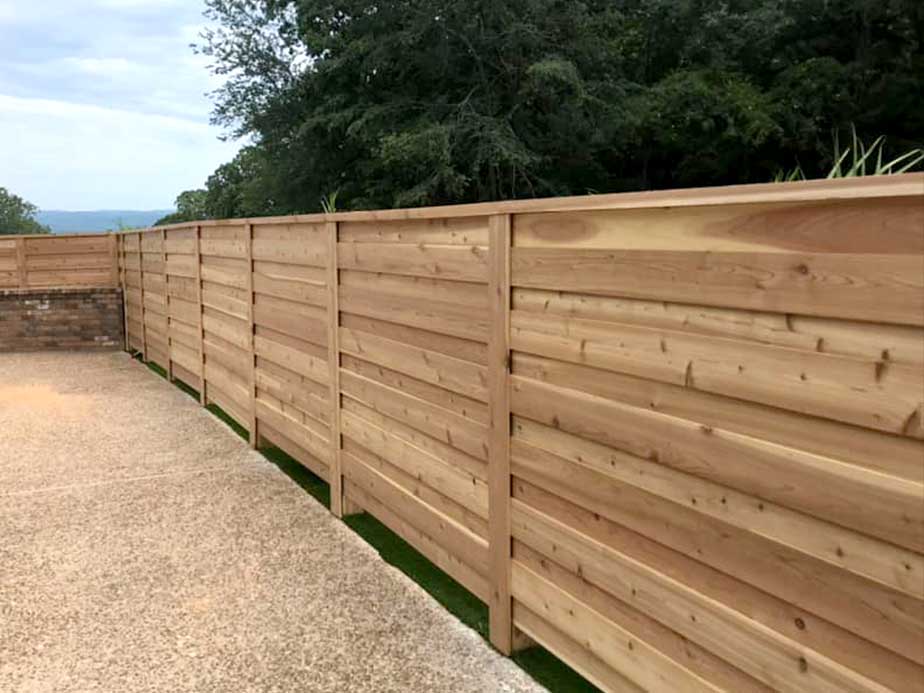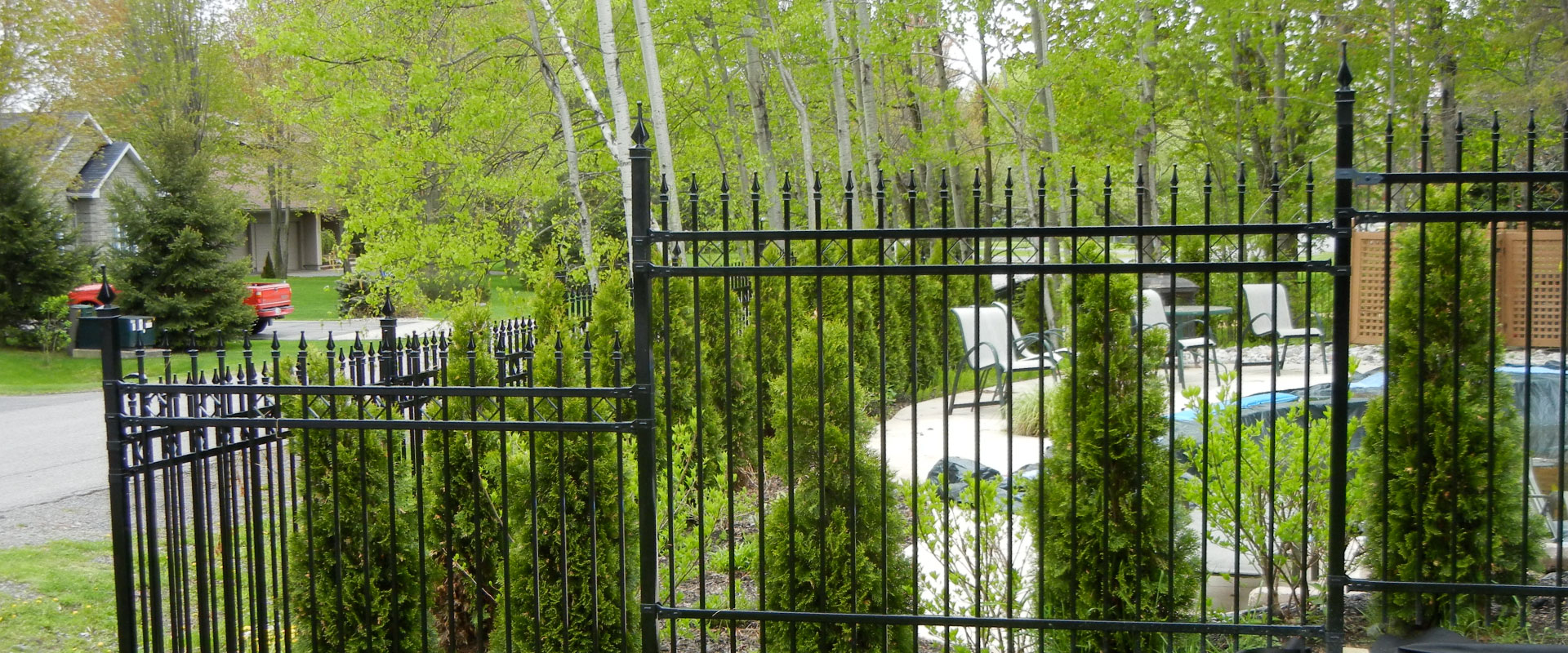All Categories
Featured
Picking the ideal fence for your property includes mindful consideration of capability, appearances, spending plan, and long-lasting upkeep. Whether you're seeking to enhance personal privacy, boost aesthetic charm, or safeguard your home, comprehending your choices will aid you make a notified choice. Right here's a comprehensive guide to choosing the perfect fence for your needs.
![]()
Personal Privacy: Tall, strong fences like wood or plastic are excellent for obstructing presence. Safety: Sturdy products like aluminum or steel give a secure barrier. Visual Charm: Ornamental fences, such as functioned iron or picket styles, enhance curb charm. Containment: For kids or animals, fences like chain-link or vinyl are functional selections. Sound Decrease: Dense products, such as composite fencing, can assist moisten noise. Clearly identifying your goals will narrow down your alternatives considerably.
Wood: Provides an all-natural, classic appearance and is extremely adjustable yet needs regular upkeep. Plastic: Reduced maintenance and long lasting but may have a greater first expense. Light weight aluminum: Lightweight, rust-resistant, and elegant, though not perfect for privacy. Chain-Link: Budget-friendly and functional yet lacks aesthetic charm and personal privacy. Wrought Iron: Ornamental and sturdy but can be costly and requires maintenance. Compound: A blend of wood and plastic, using longevity with a wood-like look. Choose a material that straightens with your priorities and complements your building's design.
![]()
Low Upkeep: Plastic, aluminum, and composite fences require occasional cleaning. Moderate Maintenance: Wrought iron fencings might require repainting to stop corrosion. High Upkeep: Timber fences require normal discoloration, securing, or painting. Take into consideration just how much time and effort you're eager to buy upkeep for many years.
A picket fencing matches a conventional home. A modern residential property may look best with smooth, minimal secure fencing products like plastic or steel. A country residential or commercial property might gain from rustic wood or split-rail fencing. 7. Seek Specialist Suggestions. Consulting a fence specialist can aid guarantee you select the best product, style, and installment process for your property. Professionals can assess variables like soil climate, type, and incline to advise one of the most ideal choices.
Conclusion. Selecting the right fence for your building entails stabilizing functionality, aesthetic appeals, and expense. Beginning by recognizing your objectives, exploring materials, and thinking about maintenance and budget plan. With thoughtful preparation and specialist recommendations, you can locate the best fencing to boost your residential or commercial property's worth, safety, and appeal for several years to find.
- Define Your Objective. The initial step in picking a fence is identifying why you require one. Common purposes consist of:

Personal Privacy: Tall, strong fences like wood or plastic are excellent for obstructing presence. Safety: Sturdy products like aluminum or steel give a secure barrier. Visual Charm: Ornamental fences, such as functioned iron or picket styles, enhance curb charm. Containment: For kids or animals, fences like chain-link or vinyl are functional selections. Sound Decrease: Dense products, such as composite fencing, can assist moisten noise. Clearly identifying your goals will narrow down your alternatives considerably.
- Consider Product Options. Each secure fencing material has unique qualities, benefits, and disadvantages. Below's a fast introduction:
Wood: Provides an all-natural, classic appearance and is extremely adjustable yet needs regular upkeep. Plastic: Reduced maintenance and long lasting but may have a greater first expense. Light weight aluminum: Lightweight, rust-resistant, and elegant, though not perfect for privacy. Chain-Link: Budget-friendly and functional yet lacks aesthetic charm and personal privacy. Wrought Iron: Ornamental and sturdy but can be costly and requires maintenance. Compound: A blend of wood and plastic, using longevity with a wood-like look. Choose a material that straightens with your priorities and complements your building's design.

- Consider Maintenance Needs. Different fencing products call for varying levels of care:
Low Upkeep: Plastic, aluminum, and composite fences require occasional cleaning. Moderate Maintenance: Wrought iron fencings might require repainting to stop corrosion. High Upkeep: Timber fences require normal discoloration, securing, or painting. Take into consideration just how much time and effort you're eager to buy upkeep for many years.
- Evaluate Your Spending plan. Fence prices include both materials and installation. While chain-link and timber are generally extra cost effective upfront, materials like vinyl and aluminum might save money over time due to minimized maintenance needs. Additionally, factor in potential upgrades, such as gates or ornamental components, when setting your budget plan.
- Inspect Regional Regulations and HOA Policies. Before completing your choice, get in touch with local zoning legislations and property owner organization (HOA) guidelines. Some areas have height restrictions, product restrictions, or design standards that may affect your choice.
- Suit the Fencing to Your Property's Design. The design of your fencing ought to enhance your home and landscape. As an example:
A picket fencing matches a conventional home. A modern residential property may look best with smooth, minimal secure fencing products like plastic or steel. A country residential or commercial property might gain from rustic wood or split-rail fencing. 7. Seek Specialist Suggestions. Consulting a fence specialist can aid guarantee you select the best product, style, and installment process for your property. Professionals can assess variables like soil climate, type, and incline to advise one of the most ideal choices.
Conclusion. Selecting the right fence for your building entails stabilizing functionality, aesthetic appeals, and expense. Beginning by recognizing your objectives, exploring materials, and thinking about maintenance and budget plan. With thoughtful preparation and specialist recommendations, you can locate the best fencing to boost your residential or commercial property's worth, safety, and appeal for several years to find.
Latest Posts
Explore Special Auto Repair Offers in Chicago at Montclare Auto Repair
Published May 28, 25
1 min read
Discover the Premier Auto Repair Deals in Montclare, Chicago
Published May 27, 25
1 min read
Check Out Top Vehicle Maintenance Solutions at Montclare Auto Repair – Quality Service Today
Published May 26, 25
1 min read
More
Latest Posts
Explore Special Auto Repair Offers in Chicago at Montclare Auto Repair
Published May 28, 25
1 min read
Discover the Premier Auto Repair Deals in Montclare, Chicago
Published May 27, 25
1 min read
Check Out Top Vehicle Maintenance Solutions at Montclare Auto Repair – Quality Service Today
Published May 26, 25
1 min read